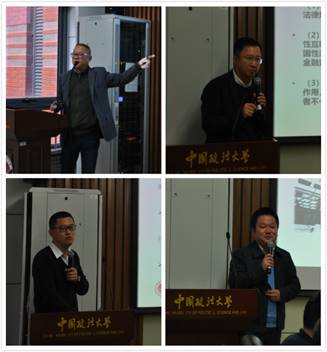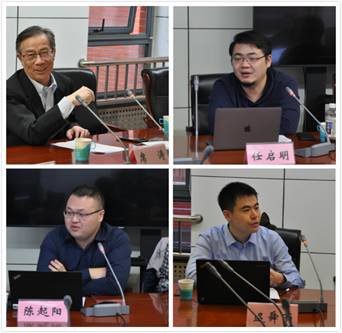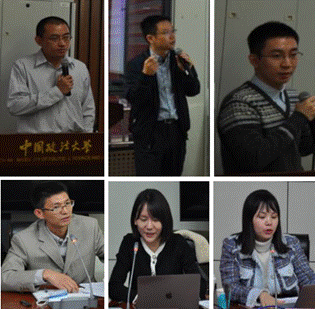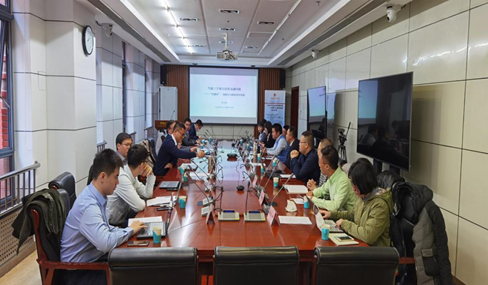On October 25, 2020, a conference "New Technologies in Banking and Securities: From the Perspective of Law and Finance" was held in B209, Research Building, College Road Campus, hosted by Development Planning Office, Research Office and Research Institute of Law and Economics of China University of Political Science and Law. The conference was held in Conference Room B209, Research Building, College Road Campus. More than fifty guests attended the conference from Peking University, Renmin University, University of International Business and Economics, Central University of Finance and Economics, Beijing University of Business and Economics, Hefei University of Technology, China University of Political Science and Law, and other practical departments such as People's Bank of China, State Administration of Foreign Exchange, Shenzhen Stock Exchange, National Small and Medium Enterprises Stock Transfer System and China National New Holdings Co.
The seminar was divided into three modules. The opening ceremony was hosted by Associate Professor Xu Wenming, and Professor Xi Tao from the Institute of Law and Economics delivered the opening speech. Professor Xi Tao expressed a warm welcome to the participants and briefly introduced the background of the seminar, which was held in 2019, when the Law University approved the interdisciplinary project of "Law and Finance" under the responsibility of Professor Xi Tao. In the construction of the discipline, when banking and securities encounter new financial models caused by new technologies, how to respond and explain these issues from the perspective of law and finance, and integrate them into research and teaching materials? Therefore, this seminar is held to listen to the suggestions and opinions of experts and scholars on this issue.


The first module, entitled "The New Securities Law and Securities Regulation", was chaired by Prof. Xi Tao. Professor Yin Jianfeng from the School of Finance of the University of International Business and Economics gave a presentation entitled "Several Major Issues in Financial Theory", analyzing the "double cycle" and the financial restructuring of China's economy, and that the key to enhancing consumption is to accelerate the sound and sustainable development of the capital market. He then discussed the issue of population aging as a long-term challenge for China. The report concludes with an analysis of the reform of China's fiscal and monetary system, arguing that the fiscal system needs to shift to public finance, the monetary system needs to establish a sovereign credit model, and fiscal and monetary policies need to be closely coordinated.

Associate Professor Tang Yingmao from Peking University School of Law gave a presentation titled "How Local Financial Regulation Affects National Legal Norms: An Empirical Study Based on Online Micro-finance". Associate Professor Xu Wenming from the Institute of Law and Economics of China University of Political Science and Law presented "Research on the 'Materiality' Standard of Information Disclosure in the Context of the New Securities Law". The report combined the "price sensitivity test" and "investor decision test" and proposed a "new duality theory" for judging "materiality". In other words, when the information is weakly price-sensitive or there is a lack of relevant data, which makes the "price-sensitive test" inapplicable, the "investor decision test" can be used as a principle criterion to evaluate the "materiality" of information. The "investor decision test" can function as a principle norm for evaluating the "materiality" of information when the information is weakly price-sensitive or the "price sensitivity test" is not applicable, thus effectively protecting investors' rights.
Dr. Shi Jin of National Small and Medium Enterprises Stock Transfer System Co., Ltd. gave a presentation entitled "Development and Challenges of Securities Market Disclosure System under the New Technological Wave". According to the report, "the massive listing of innovative enterprises" and "the development of relevant information technology" are two important features of the current securities information disclosure. Postdoctoral Fellow Chen Qiyang of Shenzhen Stock Exchange, during the discussion, considered that the application of current disclosure regulation rules to information disclosure made by social media deserves further consideration.
Assistant Professor Ren Qiming from the School of Civil and Commercial Economics of China University of Political Science and Law, Assistant Professor Chi Shunyu from the Institute of Law and Economics and Dr. Chen Qiyang from Shenzhen Stock Exchange were the panelists to comment on the report of the first session.
The second session was entitled "Banking and New Technology" and was moderated by Associate Professor Xu Wenming. Dr. Wu Yun from the Anti-Money Laundering Bureau of the People's Bank of China gave a presentation entitled "Virtual Currency: A Failed Private Currency Experiment? Dr. Wu Yun gave a presentation on "Virtual Currency: A Failed Private Currency Experiment? Dr. Wu Yun argued that although the technological innovation brought by virtual currencies has an important positive effect on the economic model and social pattern, from the perspective of monetary function, this private monetary social experiment has been a failure so far.
Li Xiang, an expert in blockchain industry, gave a keynote speech on "Analysis of the Legal Nature of Crypto Assets". He sorted out the development of crypto assets with blockchain as the underlying technology, and analyzed the legal properties of crypto assets with reference to the California HashFast case.
Assistant Professor Li Wenjing from the Institute of Law and Economics gave a presentation entitled "Liability and Behavioral Incentives for Fintech Platforms". He believed that it is difficult to internalize the risks of online lending platforms through contract law alone, resulting in insufficient deterrence of liability mechanisms for post-event remedies.
Afterwards, Associate Professor Zhou Qian from the Law School of Hefei University of Technology, Dr. Dai Xinqi, Manager of the Central Foreign Exchange Business Center of the State Administration of Foreign Exchange, and Dr. Xie Yaowen, Postdoctoral Fellow of the Faculty of Law and Economics of China University of Political Science and Law, commented on the report of Unit 2.
The theme of the third session was "Securities Industry and New Technology", which was moderated by Associate Professor Zhou Qian from the Law School of Hefei University of Technology. Associate Professor Miao Yinchi from the Law School of Central University of Finance and Economics gave a presentation entitled "When Securities Brokerage Clearing Meets External Access Information System: Reflections on Relevant Law Enforcement Cases". Professor Miao discussed whether the use of external access system constitutes illegal brokerage and illegal clearing business, and raised two institutional issues: "how to understand the impact of new technology on the legal system of trading" and "how to deal with the relationship between lax regulation beforehand and severe enforcement afterwards".
Assistant Professor Zhong Wei from the Law School of Renmin University of China gave a presentation entitled "The Origin, Alienation and Regulation of Fiduciary Obligations of Intelligent Investment Advisors". He believes that the main problem of regulation of smart investment advisors lies in the regulatory path of discretionary smart investment advisors: the inclusion of discretionary smart investment advisors into the investment advisory business requires the support of high-level legislation in the capital market; the choice of including them into the asset management business requires the adoption of the regulatory scheme of discretionary account management.
Assistant Professor Lou Qiuran from the University of International Business and Economics gave a presentation entitled "Pre-arranged Trading Plan as a Deterrent to Insider Trading Liability", pointing out that pre-arranged trading plan is a balance between "combating insider trading" and "reasonable trading by directors and executives", and that there are certain loopholes in the pre-arranged trading plan under the U.S. law, which can be critically borrowed from the Chinese securities law in the process of reform.
Afterwards, Dr. Du Zhenyu, Assistant Professor of Law at Beijing Technology and Business University, Li Wenjing, Assistant Professor at the Institute of Law and Economics of China University of Political Science and Law, and Hu Jianyu, Director of Legal Compliance and Risk Management Department of China National Xin Holding Corporation, commented on the presentations in Unit 3.

Finally, Associate Professor Tang Yingmao from Peking University School of Law made a concluding speech. Professor Tang believed that it is important for the speakers to use different paradigms to analyze the regulatory reform of "finance + technology", and that traditional legal rules may face the problem of unpredictability in the current technological development, and we need to conduct more cross-disciplinary research to better solve the new problems.
The meeting was successfully concluded with warm applause.
